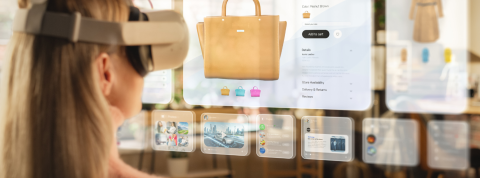
The phygital experience and the 4.0 user in Fashion and Beauty
On January 26, the round table "The phygital experience and the 4.0 user in Fashion and Beauty" was held at EAE Business School Madrid, in which they discussed how to create positive memories that make a brand unforgettable, that invites purchase and above all to high customer loyalty.
The table was made up of 5 experts from the fashion and beauty sector, including: The journalist and writer Marta Robles; Rafael Flores, General Manager Spain&Portugal of Loewe Perfumes; Alejandra Nuño, Top Voice Linkedin Gender Equity 2022 and Inspirational Speaker; Paloma Sancho, director of beauty at Revista Telva and Frida Muntión, Director of Luxury Marketing and Communication.
The table was moderated by Magali Yus, Director of External Relations of El Cortes Inglés Madrid, who opened the debate by giving the floor to Marta Robles. The journalist spoke of one of the main challenges being to convert the concept of charity into solidarity, "since through Marketing in Fashion and Beauty we must try to make the world more supportive and sustainable," commented the speaker.
Marta explained that a few years ago we did not even consider questions about sustainability, but in recent years the world of beauty has become more and more committed to this concept, "something that today seems so obvious to us a few years ago we did not we raised”, declared the journalist. In this sense, brands "are increasingly aware of doing their bit to be more sustainable."
In this case, Marta gave the example of Leticia Valera and her brand KASUMA and the case of Javier Goyeneche from Ecoalf.
On the other hand, Alejandra Nuño, commented that from the field of sociology it seemed essential to transmit social skills to students with concepts such as solidarity, sustainability, etc. For this reason, he supported Marta's challenge to give sustainability more visibility, since according to Alejandra "we are living in a society that rescues polycrisis, it seems that society lives in a hack mate and for this reason we have to consider how we can contribute to the improvement of social health through the world of fashion and beauty”.
Likewise, the speaker explained that an example of this is the Adolfo Dominguez campaign, "because precisely the world of fashion and beauty can help health by focusing on balance, since health means balance, understanding beauty from the physical, emotional integration, etc” declared Alejandra.
On the other hand, Frida Muntion presented at the round table the topic of how technology can help us to better know, involve and educate our consumers. Frida explained that the beauty and cosmetics sector has had to reformulate itself after the pandemic. She has continued to bet on innovation. "We live in a time when a product by itself has no value and brands have to keep reinventing themselves."
Likewise, she commented that technology has democratized beauty, an example that the speaker gave was that we already have a hairdresser at home, who does not have a GHD or a Dyson? she asked her, "a professional channel product that we are including in the day to day of our lives"; Frida explained. “Technology has revolutionized the sector, but also the consumption process, since we have a large amount of information within reach of a click and receiving information from other people such as influencers who mark us in our purchase decision”
Frida concluded that brands have to use technology as an experience. “An example of this is how technology improves beatuy corners, creating an experience that gives the user more. All this makes the ultra-personalized”.
Continuing in the line of beauty, Paloma Sancho spoke about the challenges facing the beauty industry this year. Paloma explained that it is necessary to analyze very carefully from the point of view of the brands and how they speak to the users, "who are increasingly empowered because they have more and more information," the journalist explained.
This excess of information leads to misinformation. There is a challenge on the part of the industry, to work with the correct sources, choosing spokespersons for the culture of beauty and fashion who have to be such as dermatologists, surgeons, etc.
Another is the issue of digitization, how to deal with the sale of perfumery, cosmetics in the digital field. During the pandemic, many luxury brands developed technology to try on digital makeup, cosmetics, and perfumery. In recent years we have seen a lot about the new beauty canon. The new canon is that there is no canon. How does this reach society? Not only does it stay in marketing, but it coves.
Lastly, Rafael Flores explained that innovation does not have to be synonymous with technology, since one of the first things in the perfume world is everything related to the product.
He also talked about molecular perfumery, which allows limiting the exploitation of resources as well as reproducing aromas that did not exist before.
He ended by talking about how to communicate the aroma, since for Loewe perfumes not only the communication channel is physical, but the part is closely related because it is connected with the olfactory part; That is what brands play with when communicating an aroma. In the case of Loewe perfumes, we try to make an impact from a visual point of view when communicating a fragrance.
The round table closed with a question time from the attendees.
This round table was made up of some of the professionals from the fashion and beauty sector that make up part of the faculty of the Master in Fashion and Beauty Marketing Management that will take place next April and is co-directed by Gadea Maier, Director of Marketing and Communication at IWC Schaffhausen and Magalí Yus, Director of External Relations at El Corte Inglés.
